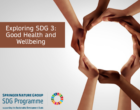 Nora D. Volkow, M.D., is the Director of the National Institute on Drug Abuse at the National Institutes of Health. A research psychiatrist and scientist by training, Dr. Volkow calls for a shift in US policies on drug addiction: For those with substance use disorders, treatment, not punishment.
Nora D. Volkow, M.D., is the Director of the National Institute on Drug Abuse at the National Institutes of Health. A research psychiatrist and scientist by training, Dr. Volkow calls for a shift in US policies on drug addiction: For those with substance use disorders, treatment, not punishment.
She argues that current laws and policies that criminalize and incarcerate people who use drugs are counter-productive, and exacerbate the current opioid overdose crisis and other addiction-related problems.
Dr. Volkow discusses her recent Perspective, published in Neuropsychopharmacology, with Elizabeth Yepez, Executive Editor for Medicine and Life Science Journals, and Rachel Daniel, Co-chair of the SN SDG Mental Health Research Group and Editorial Director for Springer Behavioral and Health Sciences Books.
Tell us about your decision to express these views in your official capacity of Director.
In my role as director of the National Institute on Drug Abuse, I oversee the largest portfolio of funded research on addiction and related issues, and I see the scientific evidence every day. Last year, 2020, was the worst year on record for drug overdose deaths, despite advances in medical treatment for opioid use disorder and widespread recognition of the addiction and overdoses crises in the United States. As a country, we have to re-evaluate how we are addressing drug use, and the science provides some answers as to what is working and isn’t regarding the issue of criminalization.
We notice you use the term “substance use disorders.” Why that language?
One of the most common misperceptions about addiction is thinking that it is a choice, or a character flaw. It is not. It is a brain disease, a chronic, relapsing disorder characterized by compulsive drug seeking and continued use despite harmful consequences, along with changes in brain circuitry. It is considered both a complex brain disorder and a mental illness. The Diagnostic and Statistical Manual of Mental Disorders V, the gold-standard text on mental illness that establishes diagnostic terminology, uses the term “substance use disorder.” It is important that our language choices, particularly in a professional context, reinforce that this is a disease that requires evidence-based medical treatment. This is still a major gap in the United States, both culturally as well as within healthcare settings.
Your piece highlights published studies (“abundant data”) that show that current enforcement, punishment, and treatment access disproportionately and negatively impacts Black lives. If this is already known, why does it persist?
It is clear that the United States is currently reckoning with a long history of discriminatory and racist policies, many of which still continue today. The War on Drugs was no exception, and by incarcerating Black people at disproportionately high rates, it has had radiating effects into health, economic security and mobility, education, housing, families – areas intrinsically connected with the well-being and success of so many Black and other people of color. In science, we often must say that we don’t yet have an answer, that “more research is needed.” But the evidence here is straightforward and solid, and needs to inform an urgent conversation.
What is an example of a “public health-based alternative” to criminalization? Is there evidence that it can work?
There is evidence of positive outcomes associated with public-health approaches to drug use, however, there is considerable variation in drug laws and enforcement practices. Of the six current models of decriminalization for dealing with drug possession, four include an approach that employs a pathway to education, treatment, or social services.
As part of the Helping to End Addiction Long-term Initiative, or NIH HEAL Initiative, the Justice Community Opioid Innovation Network (JCOIN) multi-site study is a good example of a public health-based approach. The JCOIN study is investigating approaches to increase high-quality treatment and care for people with opioid misuse and OUD in justice settings. JCOIN will test strategies to expand effective treatment and care in partnership with local and state justice systems and community-based treatment providers. Additionally, the JCOIN hub in New York is also studying an opioid court model as an alternative to imprisonment and aimed at reducing overdose, recidivism, and improve service delivery and linkage to medication for opioid use disorder.
Do you believe there is consensus behind this public health approach?
We have serious work to do. There is stigma associated with drug use and addiction that is deeply ingrained in culture and society around the world. Many diseases, particularly mental health disorders, are stigmatized. As humans, we are taught to fear sickness, and to alienate what is different from us. But this is a losing proposition. We all get sick, we all have needs, and we all benefit from a system that works to treat diseases and conditions with evidence-based care and compassion. Making this cognitive shift will likely be critical to achieving the political will to implement a widespread public health approach.
 At Springer Nature we are committed to playing our role in advancing progress towards achieving the SDGs by both supporting researchers and being an active voice, promoting an interdisciplinary evidenced-based approach to all targets and indicators within this goal. Learn more about our Springer Nature SDG Programme.
At Springer Nature we are committed to playing our role in advancing progress towards achieving the SDGs by both supporting researchers and being an active voice, promoting an interdisciplinary evidenced-based approach to all targets and indicators within this goal. Learn more about our Springer Nature SDG Programme.
Comments